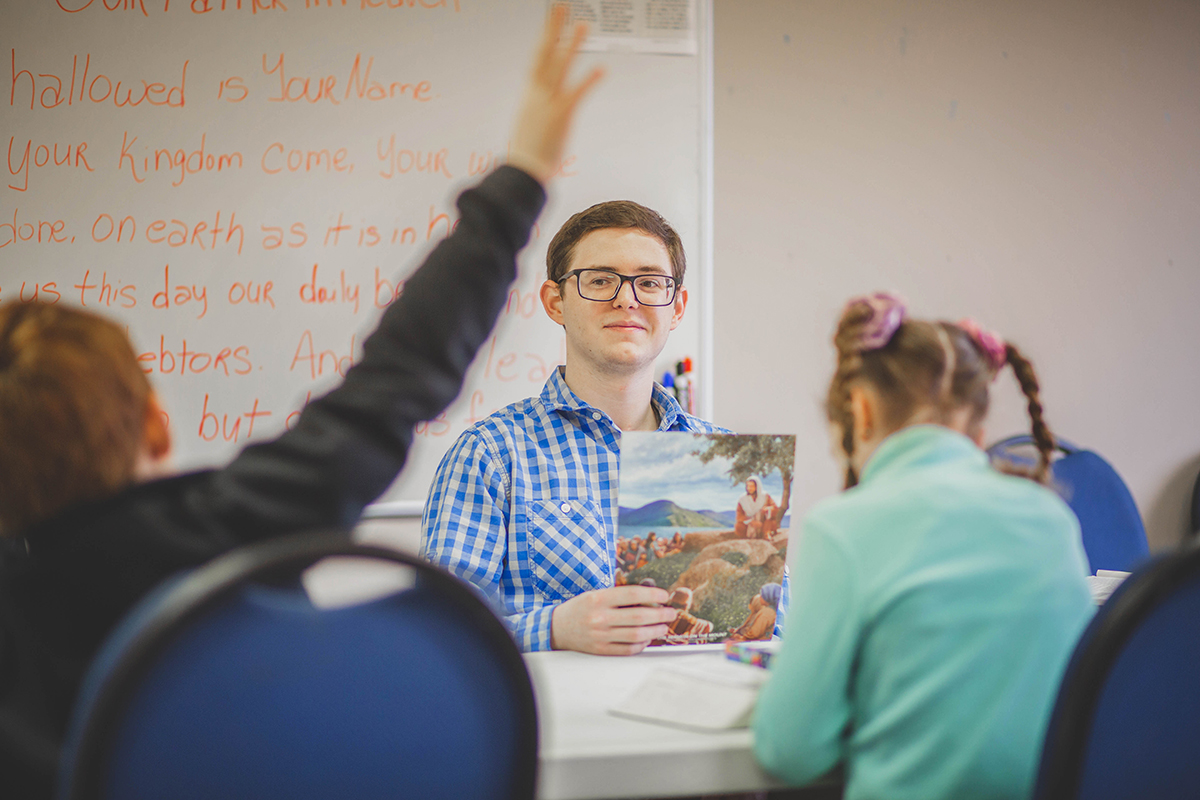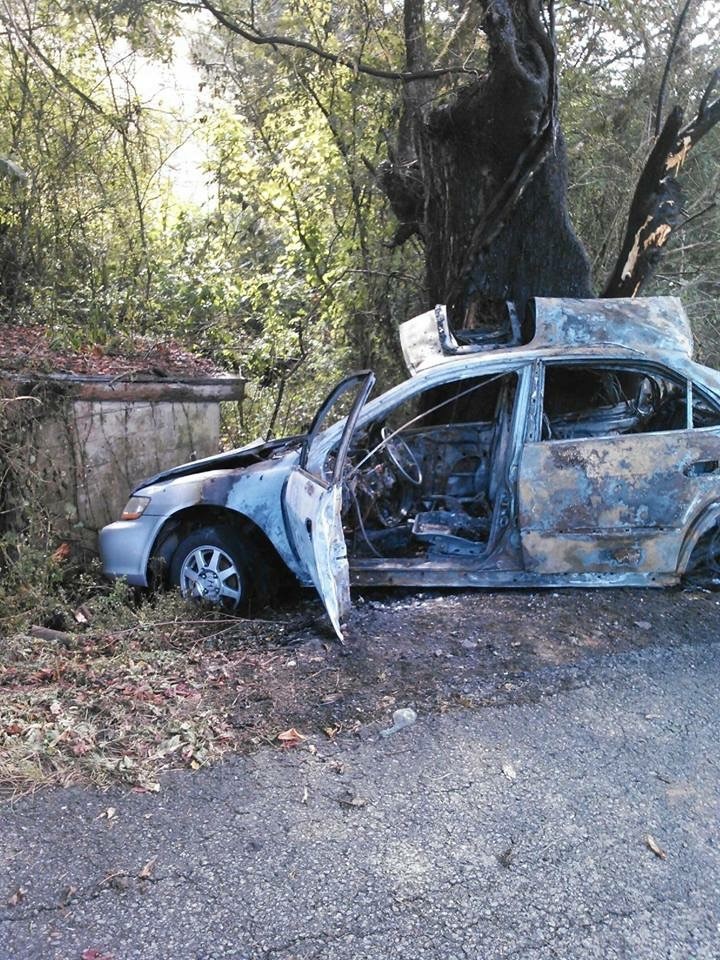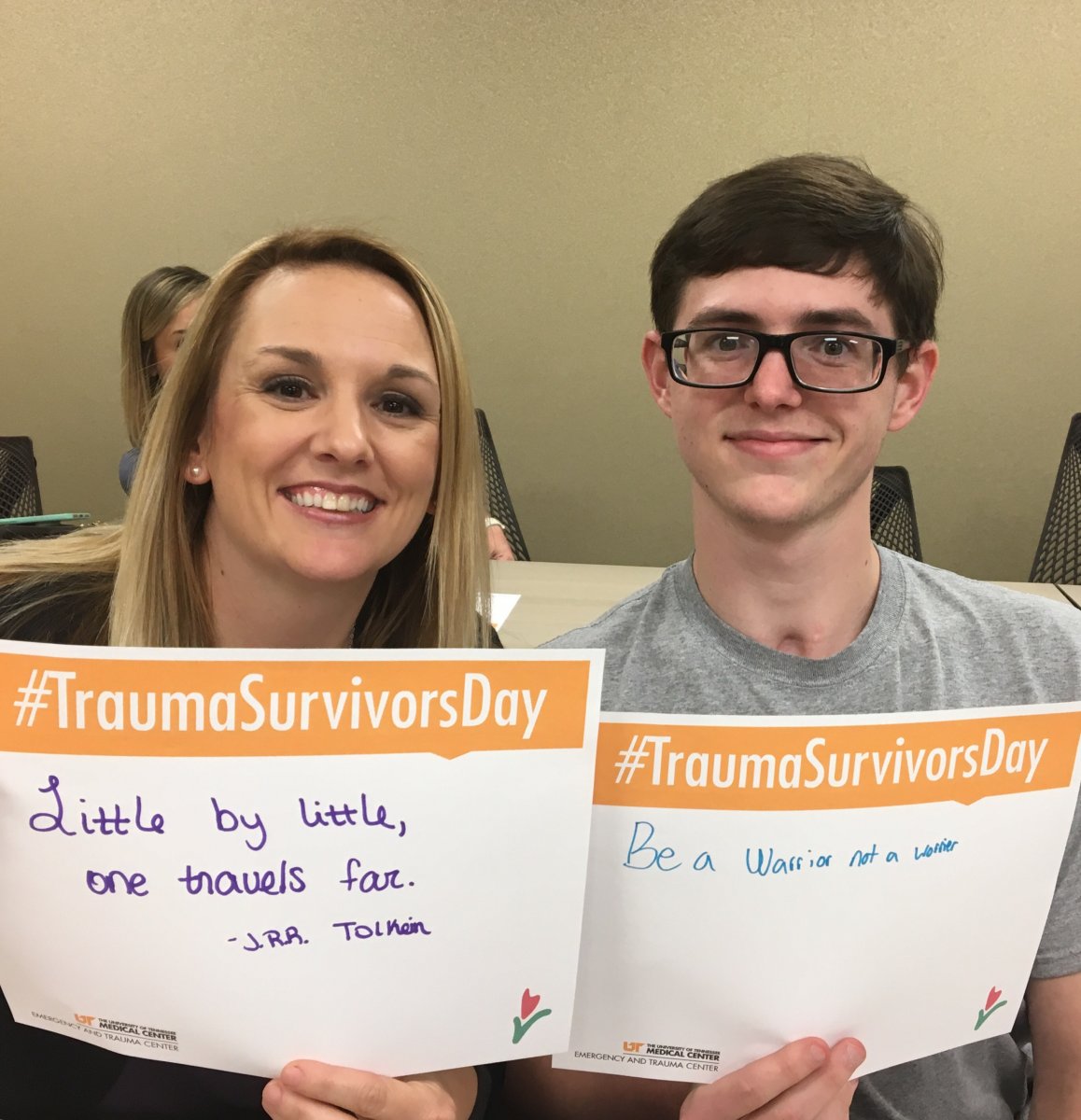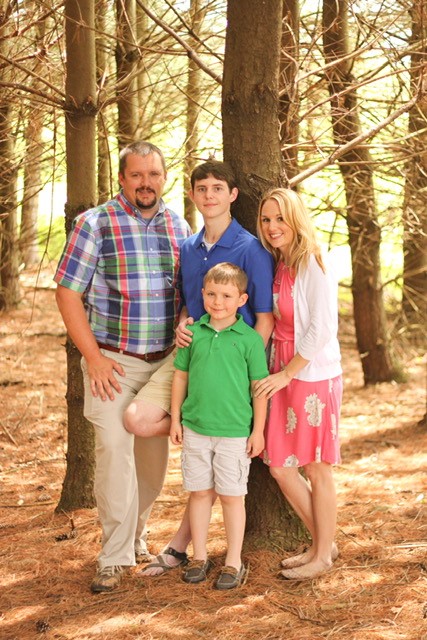Be a Warrior Not a Worrier
On September 1, 2014, high school senior, Austin McGhee, waved goodbye to his family and drove to work. “He always texted when he got to work, even though it’s only five minutes down the road,” said his mom, Jennifer Roach. “A little while after he left, we were out in the yard, and UT LIFESTAR (the medical center’s aeromedical helicopter service) flew over the house. I realized Austin hadn’t texted, and I knew
in my heart it was for him.”

Austin McGhee suffered a traumatic brain injury in a 2014 car crash. In 2020, he graduated from college and is fulfilling his lifelong dream of becoming a teacher. Here, he teaches Sunday School at his church in Knoxville, Tennessee.
Jennifer and her husband jumped in the car and followed Austin’s normal route to work. When they arrived at the scene of the crash, they found the burnt-out shell of his car smashed against a tree.
“I fell down on the ground, devastated,” Jennifer said.
A Grim Diagnosis
After running tests, doctors at the medical center diagnosed Austin with a diffuse axonal injury (DAI). A DAI happens when an impact shakes the brain in the skull, tearing the brain’s nerve fibers.

Austin’s car caught fire in the crash.
In Austin’s case, he also had life-threatening brain bleed, called a subarachnoid hemorrhage. He also suffered an acute respiratory failure, where fluid builds up in your lungs.
Austin’s Glasgow Coma Scale (GCS), which grades the level of a patient’s consciousness, was at three, which is the lowest possible score. Doctors put him on life support and placed a tube in his throat to help him breathe. They also placed a tube in his stomach to feed him through.
According to the JAMA Network, of people with a GCS score of three, 89 percent die in the first 30 days. But the doctors were still hopeful, in part because of Austin’s age. “With brain injuries everyone is so different,” said Jennifer. “They couldn’t tell us what to expect.”
After spending several hours in the Emergency Department, Austin was transferred to the Trauma Surgical Intensive Care Unit (TSICU), where he stayed for 11 days. Jennifer stayed with him the whole time and had a front-row seat for his care. “The nurses in critical care were so good,” said Jennifer. “You could tell that they loved and cared for Austin.
A Timely Visit
While Austin was at the medical center, a young woman who’d been in a car crash and had a similar brain injury came by to see him. She was still recovering, but she could walk and talk again and, said Jennifer, “That gave us hope.”
During their visit, the young woman mentioned her recovery at the Shepherd Center. Located in Atlanta, Georgia, the Shepherd Center, specializes in rehabilitation for people with brain and spinal cord injuries.
So, after 11 days in TSICU, Austin transferred to Shepherd. “We had so much support from our family, church and friends,” said Jennifer. “I was able to take a leave of absence from my job so I could stay with Austin in Atlanta.” Her husband and other family members came down to visit every week, as well.
One Step Forward, One Step Back
When they got to the Shepherd Center, Austin woke up. “What a miracle,” Jennifer said. “I thought that meant he’d recovered.
But it didn’t.”
They had a long, emotional road in front of them. Austin would advance in one area – for example, he relearned how to walk. But he’d regress in another. So, even though he could walk, he lost his ability to use his arms.
Neuropsychologist, D. Malcolm Spica, PhD, of The Pat Summitt Clinic, said that people’s recovery varies widely as they heal from a diffuse axonal injury. “It’s like being a hiker in familiar woods and encountering a new barrier,” he said. “You can still get where you’re going, but you must find a new path.” While at times, it seemed like Austin wasn’t improving, his brain’s neural pathways were busy making new trails.
Learning to Live Again

Austin McGhee and his mom, Jennifer Roach, at a Trauma Survivors Network event in Knoxville, Tennessee
After two and a half months, Austin went home. By then, he could recognize what his family was saying and even smiled at their jokes. “I’d say, ‘Okay, God, I know he’s in there because he’s getting these jokes,’” said Jennifer.
After another two months recuperating at home, Austin still couldn’t communicate. “I begged him to say ‘Mom.’ And after four and a half months, he whispered it to me.” After that, Austin slowly started talking. His first unprompted sentence was, “Good job, Caleb,” when his younger brother did well on a video game.
As soon as he started talking, Austin went back to the Shepherd Center’s outpatient program, called Pathways. While he was there, his feeding tube came out and he started eating on his own. He also started relearning all the skills he’d lost as a result of the traumatic brain injury.
“It was a hard and frustrating time for us all,” said Jennifer. “His friends were working, going to school and applying for college, and Austin was relearning how to use a butter knife.
A Dream of Teaching
Luckily, Austin had focused on his academics before the wreck. As a result, he was so far ahead in high school he was able to
graduate on time.
And his family made sure he didn’t miss out on the fun of his senior year. Since he couldn’t attend his school’s prom, his church, family and friends threw one for him.
After he graduated, Austin decided to pursue his lifelong dream of becoming a teacher. He started with one class, gradually working up to full time, and he’s now a senior. He’s also student-teaching at Bean Station Elementary.
Although it now takes him longer to do things than it did before, Jennifer believes that’s a good thing. “He had it so easy, academically, before the wreck,” she said. “But now, he also understands the kids who are struggling.”
Not One Bad Day

Austin McGhee (middle) with his family in 2019
Jennifer said that the thing she’s most proud of is that Austin never asks, “Why me?”
“You hear about people who’ve become angry, have outbursts and all that stuff,” said Jennifer. “But Austin doesn’t. He has his down days, sure. And he gets frustrated at not being able to keep pace with friends. But otherwise he’s happy.” And, she noted, it’s made him more mature because he’s been through so much.
Jennifer said her family has seen God’s hand in everything. For one thing, this has given their family an opportunity to be on the receiving end of their community’s support. “We’ve always been the givers, but this has allowed us to be on the receiving end, which has been a blessing.”
A positive attitude is what gets them through. “If you don’t have that,” asked Jennifer, “then what do you have?”
The Trauma Survivors Network
The Trauma Survivors Network is a community of patients and families like you who are looking to connect with one another and rebuild their lives after a traumatic injury. Joining this community can help ease the anxiety and frustration often experienced following a traumatic injury.
